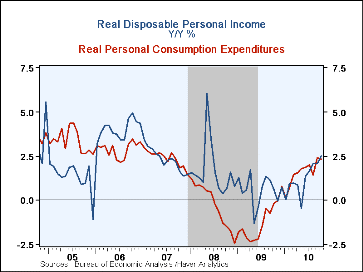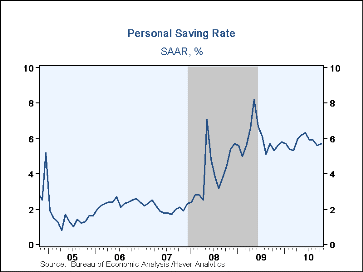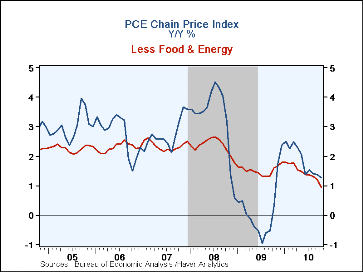 Global| Nov 24 2010
Global| Nov 24 2010U.S. Personal Income & Spending Firm While Savings Improves
by:Tom Moeller
|in:Economy in Brief
Summary
Personal income may be finally on the mend. Overall income recovered 0.5% last month after a September dip and a 0.5% August gain, both of which were slightly higher than reported last month. A 0.4% gain last month had been expected. [...]
 Personal income may be finally on the mend. Overall income recovered
0.5% last month after a September dip and a 0.5% August gain, both of which were
slightly higher than reported last month. A 0.4% gain last month had been
expected. The catalysts for the October income gain was an improved 0.6%
increase in wages & salaries (3.4% y/y), a 0.9% rise (5.7% y/y) in
proprietors income and a 1.0% jump (-1.0% y/y) in interest income. These gains
offset a 0.6% decline in dividend income though it remained up a firm 6.1% from
last year. Also to the downside was a 4.1% drop (-5.9% y/y) in unemployment
insurance benefits (-18.8% y/y). The latest drop is part of the downdraft
following the extension of jobless insurance payouts during August. These pieces
added up to a 0.4% increase in disposable income which, when adjusted for
prices, rose 0.3%. The y/y gain of 2.5% in real disposable income was the
strongest since 2008 when a tax cut stimulated a jump.
Personal income may be finally on the mend. Overall income recovered
0.5% last month after a September dip and a 0.5% August gain, both of which were
slightly higher than reported last month. A 0.4% gain last month had been
expected. The catalysts for the October income gain was an improved 0.6%
increase in wages & salaries (3.4% y/y), a 0.9% rise (5.7% y/y) in
proprietors income and a 1.0% jump (-1.0% y/y) in interest income. These gains
offset a 0.6% decline in dividend income though it remained up a firm 6.1% from
last year. Also to the downside was a 4.1% drop (-5.9% y/y) in unemployment
insurance benefits (-18.8% y/y). The latest drop is part of the downdraft
following the extension of jobless insurance payouts during August. These pieces
added up to a 0.4% increase in disposable income which, when adjusted for
prices, rose 0.3%. The y/y gain of 2.5% in real disposable income was the
strongest since 2008 when a tax cut stimulated a jump.
Personal consumption expenditures rose 0.4% last month after an upwardly revised 0.3% September gain. A 0.5% October increase had been expected. Spending on goods jumped 1.1% (5.7% y/y) due to a 3.6% surge (7.5% y/y) in spending on gasoline thanks to higher prices. Spending on motor vehicles also jumped 4.5% (14.3% y/y). Elsewhere, spending on goods generally firmed as well. Spending on services inched up 0.1% (2.6% y/y) for the second consecutive month.
The personal savings rate rose to 5.7% from an upwardly revised 5.6% in September. The savings rate remained down from the 5.9% level for all of last year though it remained up from the monthly low of 1.8% late in 2007.
Price inflation remained modest. The PCE chain price index rose 0.2% after September's 0.1% uptick. The core PCE price deflator was unchanged for the second consecutive month. The declines resulted from lower monthly prices for autos (+2.8% y/y), furniture (-4.0% y/y) and apparel (-1.5% y/y). Twelve month growth of 1.3% in prices overall was the weakest since the early1960s.
The personal income & consumption figures are available in Haver's USECON and USNA databases.
The Federal Reserve cut its expectations for growth in output and employment. The minutes to the latest FOMC meeting can be found here.
| Personal Income & Outlays (%) | October | September | August | Y/Y | 2009 | 2008 | 2007 |
|---|---|---|---|---|---|---|---|
| Personal Income | 0.5 | -0.0 | 0.5 | 4.1 | -1.7 | 4.0 | 5.7 |
| Wages & Salaries | 0.6 | 0.1 | 0.3 | 3.4 | -4.3 | 2.1 | 5.8 |
| Disposable Personal Income | 0.4 | -0.1 | 0.5 | 3.8 | 0.7 | 5.1 | 5.1 |
| Personal Consumption Expenditures | 0.4 | 0.3 | 0.5 | 3.6 | -1.0 | 3.0 | 5.2 |
| Saving Rate | 5.7 | 5.6 | 5.9 | 5.3 (Oct.'09) | 5.9 | 4.1 | 2.1 |
| PCE Chain Price Index | 0.2 | 0.1 | 0.2 | 1.3 | 0.2 | 3.3 | 2.7 |
| Less Food & Energy | 0.0 | 0.0 | 0.1 | 0.9 | 1.5 | 2.3 | 2.4 |
Tom Moeller
AuthorMore in Author Profile »Prior to joining Haver Analytics in 2000, Mr. Moeller worked as the Economist at Chancellor Capital Management from 1985 to 1999. There, he developed comprehensive economic forecasts and interpreted economic data for equity and fixed income portfolio managers. Also at Chancellor, Mr. Moeller worked as an equity analyst and was responsible for researching and rating companies in the economically sensitive automobile and housing industries for investment in Chancellor’s equity portfolio. Prior to joining Chancellor, Mr. Moeller was an Economist at Citibank from 1979 to 1984. He also analyzed pricing behavior in the metals industry for the Council on Wage and Price Stability in Washington, D.C. In 1999, Mr. Moeller received the award for most accurate forecast from the Forecasters' Club of New York. From 1990 to 1992 he was President of the New York Association for Business Economists. Mr. Moeller earned an M.B.A. in Finance from Fordham University, where he graduated in 1987. He holds a Bachelor of Arts in Economics from George Washington University.
More Economy in Brief
 Global| Feb 05 2026
Global| Feb 05 2026Charts of the Week: Balanced Policy, Resilient Data and AI Narratives
by:Andrew Cates








